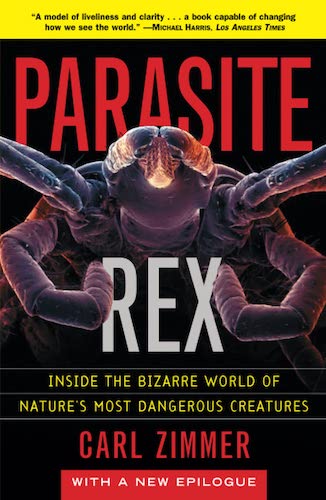I've just finished reading Carl Zimmer's excellent book, Parasite Rex. By the time you get to the end of it, you're left pretty much convinced that parasite-host arms races might be one of the major forces behind evolution.
I've always suspected that sexual selection is a lot more important than it is generally given credit for, but parasites are behind that too, it seems. The need to create greater genetic diversity to combat parasitic infections might be the reason why organisms started having sex in the first place; and the need to prove to potential mates that their owners are good at fighting parasitic infections might be the reason for many anatomical features associated with sexual selection, such as the peacock's tail.
But, to me, the most interesting section of the book is where Zimmer describes how parasites evolve and speciate as their hosts evolve and speciate. In one particularly interesting example, Zimmer describes how tetrabothriid tapeworms are found only in certain marine birds such as puffins, and certain marine mammals such as whales. It is unlikely that these birds and mammals got their tapeworms from fish, because the tetrabothiids' nearest living relatives are found in certain reptiles, not in fish. So, it would seem that the birds and mammals were originally infected by tapeworms which lived at least part of their lifecycles inside reptilian hosts. The most likely candidates for reptilian host species are pterosaurs and icthyosaurs, which went extinct 65 million years ago. The birds' ancient ancestors presumably caught the reptiles' tapeworms while the tapeworms were living part of their lifecycles inside intermediate fish hosts. Much later, the whales were similarly infected by related species of these tapeworms.
All of which got me thinking (albeit whimsically): Charles Darwin famously predicted the existence of a species of Madagascan moth (since aptly named Xanthopan morgani praedicta), based on the shape of the nectaries of a species of orchid (Angraecum sesquipedale). Might it not be possible to take a leaf out of Darwin's book and make similar deductions retrospectively? Could parasitologists not study tetrabothiids and other modern parasites, and make deductions about their extinct ancestral hosts' lifestyles?
It wouldn't be easy, but it's a fascinating idea.
